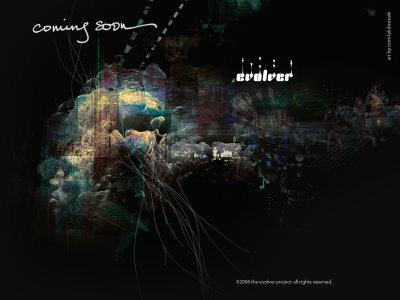Slisesix
 I am the Source
I am the Source
- by Percy Bysshe Shelley
People imagine that it is a presumptive claim, whereas it is really a presumptive claim to say "I am the slave of God"; and "I am God" is an expression of great humility. The man who says "I am the slave of God" affirms two existences, his own and God's, but he that says "I am God" has made himself non-existent and has given himself up and says "I am God", that is, "I am naught, He is all; there is no being but God's." This is the extreme of humility and self-abasement.
 I met a traveller from an antique land
I met a traveller from an antique land"My name is Ozymandias, king of kings:Nothing beside remains. Round the decay
Look on my works, ye Mighty, and despair!"
 The King and I
The King and I
|
| "We are well aware that this kind of philosophy is obsolete; that the capacity of man is considered unequal to the discovery of essential Causes; and that all pretensions to interior illumination have appeared fanciful, and are lightly esteemed in the comparison with modern experimental sciences. It may be a question however whether they, who have determined thus, were competent judges; whether they have at all entered upon the ground of the ancient doctrine to prove it, or studied so far as even to surmise the Method by which the ancients were assisted to propound the mystery of the Causal Principle in life."
|
True philosophers--a rare species in the modern world--quest for the universal substrate of life, the essence which subsists in all that gains existence through this elemental constituent. This underlying element is sometimes referred to as force, light, substance, entity, or higher consciousness.
"The force referred to, and with which the Hermetist sought to become identified," Mary Atwood indicates, "is that of the Light which in the philosophical prologue to the fourth Gospel is called 'the life of men' and 'without which is nothing which has been made,' however unconscious of its latent presence its creatures may be--for it 'dwelleth in darkness and the darkness comprehendeth it not.' It is the Light that, anteriorly to that of the solar and stellar bodies and all other derivatives from it, originated at the primal Fiat Lux [let there be light]. . ." |
Hermeticists referred to this essence as Materia Prima, the "First Matter," una sola Res: "the One Thing," the basal substrate underlying all terrestrial phenomena. Some seers believed this elemental essence to be incapable of being externalized, and therefore cognized only introspectively, while others held that it is capable of sensory appearance.
The authentic philosopher distinguishes between the two aspects of knowledge:
|
|
For most people, faith in ordinary perception is total; they believe that they see, hear, taste, smell, and touch a "real" world "out there" with unquestionable verity. They assume that reality is as they experience it. The ordinary world-view is not only acceptable but preferable to any other they might consider. Certainly, for the ordinary events of life their perception is accurate enough to allow them to avoid running into tall buildings and anticipating that the sun will "rise" 1 in the morning without fail.
Because of our modern assumption that ordinary perception puts us in touch with reality, it's difficult to understand what philosophers have meant by searching for the ultimate nature of reality. For most people, it doesn't make sense to search for something you already have; if you already know reality through ordinary perception, why would you search for it?

We must somehow develop the realization of the delusory nature of sense experience and comprehend that reality is something which is largely unknown and deeply mysterious. The difficulty is that our ordinary "description" of the world works and appears to provide us with the ultimate grasp of reality.
In this essay, we'll be engaging in exercises which provide a definite experience of the unreliability of our sense perceptions, so we can begin to comprehend that reality is something unknown and mysterious. The exercises can feel like nonsense to those who are incapable of suspending their total belief in their ordinary perceptions. Persons of this kind dismiss metaphysical exercises with glib statements such as: "Of course this is a seeming perceptual illusion, but it is caused by . . ." Such people like to feel they "save" their "interpretation" of reality with such magical phrases as "visual illusion." Even after experiencing an instance where their senses reveal two different "realities," their ordinary sense of knowing reality unquestionably remains.

Labels: nature, philosophy, reality
 At the end of each day's practice session, they sat beneath a coil of wire that sent a brief magnetic pulse into the motor cortex of their brain, located in a strip running from the crown of the head toward each ear. The so-called transcranial- magnetic-stimulation (TMS) test allows scientists to infer the function of neurons just beneath the coil. In the piano players, the TMS mapped how much of the motor cortex controlled the finger movements needed for the piano exercise. What the scientists found was that after a week of practice, the stretch of motor cortex devoted to these finger movements took over surrounding areas like dandelions on a suburban lawn. The finding was in line with a growing number of discoveries at the time showing that greater use of a particular muscle causes the brain to devote more cortical real estate to it.
At the end of each day's practice session, they sat beneath a coil of wire that sent a brief magnetic pulse into the motor cortex of their brain, located in a strip running from the crown of the head toward each ear. The so-called transcranial- magnetic-stimulation (TMS) test allows scientists to infer the function of neurons just beneath the coil. In the piano players, the TMS mapped how much of the motor cortex controlled the finger movements needed for the piano exercise. What the scientists found was that after a week of practice, the stretch of motor cortex devoted to these finger movements took over surrounding areas like dandelions on a suburban lawn. The finding was in line with a growing number of discoveries at the time showing that greater use of a particular muscle causes the brain to devote more cortical real estate to it.But Pascual-Leone did not stop there.
Labels: brain, brain matters, challenges, happiness, happy, life, meditation, mind, neuroplasticity, psychology, thoughts, well being
“What strange beings we are!”
noted the 13th Century mystic Rumi,
“That sitting in Hell at the bottom of the dark, we are afraid of our own immortality!”
Perhaps it is actually the power to choose our immortality, as well as everything from our personal healing to the peace of our world, that truly frightens us!
___________
A growing body of scientific evidence suggests that it is us —our consciousness— that holds the key to life and even reality itself! In 1967 the pioneering physicist Konrad Zuse married the ideas of consciousness with modern technology and proposed that our universe works like a massive consciousness computer. And just as every computer translates “Input-commands” into “Output-results,” our cosmic consciousness computer appears to do precisely the same thing! When we translate our deepest beliefs into the reality of our world, we are literally re-writing the code that makes the universe appear as it does.
Living In A Participatory Universe
A series of breathtaking discoveries has given us a powerful new way to think of our role in the universe. Rather than the conventional view that suggests we are passive observers, living a brief moment of time in a creation that already exists, the discoveries suggest that it is actually consciousness itself that is responsible for the existence of the universe! Perhaps the most revolutionary discovery supporting this idea, is the scientific fact that when we look at the stuff our world is made of — tiny quantum particles such as an electron, for example — the very act of us watching that electron changes the way it behaves in our presence. What’s more, the longer we look, the more it changes! In 1998, scientists at Israel’s Weizmann Institute of Science documented this phenomenon showing that “the greater the amount of ‘watching,’ the greater the observer’s influence on what actually takes place.” (Nature, Feb. 26, 1998) Citing such experiments, Princeton University physicist John Wheeler suggests that we not only play a role in the creation of our everyday world, but we play the prime role in what he calls a “participatory universe.” Wheeler states that we can no longer think of ourselves merely as onlookers who have no effect on the world around us, because it is impossible to simply watch. If we are alive and conscious, then we are affecting our world. “The old word ‘observer,’” he says, “simply has to be crossed off the books…and we must put in the new word ‘participator!” The key to Wheeler’s proposition is the word “participatory.” In a participatory universe, you and I are part of the equation. We are both creating the events of our lives, as well as the experiencers of what we create. Both are happening at the same time! In other words, we are like artists expressing our deepest passions, fears, dreams, and desires through the living essence of a mysterious quantum canvas. The difference between us and conventional artists, however, is that we are the canvas, as well as the images upon the canvas. We are the tools as well as the artists using the tools. And just as artists refine an image until it is just right in their minds, we may think of ourselves as perpetual artists, building a creation that is ever changing and never ending. Through our artist’s palette of beliefs, judgments, emotions, and prayers, we find ourselves in relationships, jobs, and situations of support and betrayal that play out with different people in different places. What a beautiful, bizarre, and powerful concept.
Living from the Answer
From the perspective of us participating in an ever-changing universe, the solution to any condition is a change in attitude and belief. And this is the great secret of propelling our heart’s desires from the possibility of imagination, to the reality of our everyday lives. The key is our ability to feel as if our dreams have already come to life, our prayers already answered, and live from that feeling. There is a subtle, and yet powerful difference between working toward a result, and feeling from that result. When we work toward something, we embark upon an open-ended and never-ending journey. While we may identify milestones, and set goals to get us closer to our accomplishment, in our mind we are always “on our way” to the goal, rather than in the experience of accomplishing our goal. This is precisely why Neville’s invitation to “enter the image” of our heart’s desire and “think from it” is so powerful in our lives. In the ancient studies of martial arts, we see a beautiful metaphor in the physical world for precisely the way this principle works in consciousness. When martial artists choose to break a concrete block as a demonstration of focus, for example, the very last thing in their minds is the place where their hand will touch that block. The key is to place our focus upon the completed act: the healing already accomplished, or the brick already broken. As a student of the martial arts, I was taught to do this by focusing on a point in space that is beyond the bottom of the block. The only way that my hand could be at that point was if it had already passed through the brick. In this way, I was thinking from the completion, rather than how hard it would be to get to the completion. I was feeling the joy of what it feels like to accomplish the act, rather than all of the things that must happen before I could be successful. This simple example offers a powerful analogy for precisely the way that consciousness seems to work. And this is the great secret that has been protected and preserved for us in wisdom of our past. From the monasteries of Egypt and Tibet to the forgotten texts of our most cherished traditions we are reminded that we are part of, rather than separate from, the world around us. As part of everything we see, we have the power to participate — not control or manipulate — but to consciously chart the course of our lives and our world. Please don’t be deceived by the simplicity of contemporary philosopher Goddard Neville’s words when he suggests that all we need to do is to “assume the feeling of our wish fulfilled.” In a participatory universe of our own making, why would we expect that peace, healing, and a long and healthy life should be any more difficult?
 Memorable Quotes from
Memorable Quotes from
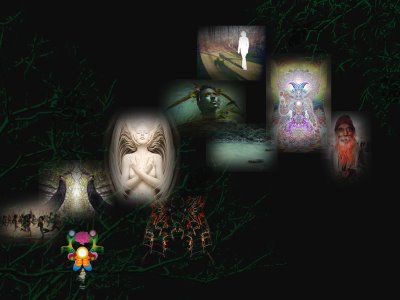
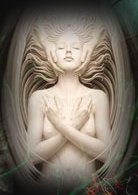
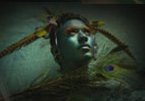 ...Evolver
...EvolverIt’s no longer about knowing what’s wrong. It’s about becoming what’s right. It’s about integrating logic and heart, vision and will. It’s about making life juicier by making good ideas real. A new world is springing up around us – of visionary politics and liberating hackers, earthly communities and galactic highs. Evolver magazine & media and the EVO membership are portals into this world.
Evolver media will spread the “new news” of what’s possible, focusing on active solutions, helpful products, new social movements, and do-it-yourself designs. At once open-source group-mind and creative meta-media, the Evolver Project is designed to creatively and quickly respond to our rapidly changing times. Through our partnerships, cultural mixology, and creatively engaged membership, the Evolver Project will also serve as a model for a passionate planetary culture: one jacked up on collaboration, connection, and exuberant renewal.
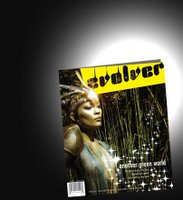 The Evolver Project is seeking contributions from artists, writers, filmmakers, photographers, visionaries, and dreamers of all kinds who are interested in giving form and expression to the emerging paradigm of planetary culture!
The Evolver Project is seeking contributions from artists, writers, filmmakers, photographers, visionaries, and dreamers of all kinds who are interested in giving form and expression to the emerging paradigm of planetary culture!
To submit art or short films, between 1 and 8 minutes: art@evolverproject.com To submit writing: submissions@evolverproject.com
